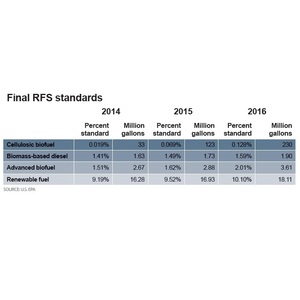AFPM files motion to intervene in RFS lawsuit

January 14, 2016
BY Erin Krueger
American Fuel & Petrochemical Manufacturers has announced it has filed a motion to intervene in the recent lawsuit brought by members of the ethanol industry against the U.S. EPA regarding its recent renewable fuel standard (RFS) rulemaking. The ethanol industry is disputing EPA’s use of its general waiver authority to lower renewable volume obligations (RVOs) under the RFS from statutory levels due to distribution issues.
In a statement, AFPM President Chet Thompson called the lawsuit “another effort by the ethanol industry to force increased amounts of ethanol produced by the petitioners’ members on consumers through an unpopular government mandate, and ignores not only the E10 blend wall but also strong consumer rejection of higher-ethanol fuels.”
On Jan. 8, seven agricultural and biofuel groups filed a petition with the U.S. Court of Appeals for the District of Columbia asking the court to review the U.S. EPA’s final rule setting 2014, 2015 and 2016 renewable volume obligations (RVOs) under the renewable fuel standard (RFS), along with the 2017 RVO for biomass-based diesel.
Advertisement
Advertisement
The petitioners include Americans for Clean Energy, American Coalition for Ethanol, Biotechnology Innovation Organization, Growth Energy, National Corn Growers Association, National Sorghum Producers, and Renewable Fuels Association.
A statement released by the petitioners indicates a preliminary, non-binding listing of issues to be raised in the court of appeals will be filed at a later date. Among other things, the petitioners said they intend to demonstrate that the EPA’s interpretation of its general waiver authority under the RFS statute was contrary to the statute.
“By focusing on fuel distribution capacity and demand rather than supply, and by failing to consider surplus [renewable identification numbers (RINs)] from prior years, the agency erroneously concluded that there was an inadequate supply of renewable fuel to justify a waiver of the levels established by Congress,” said the petitioners in the statement, noting they also plan to point out other fundamental flaws and inconsistencies in the government’s rule.
Advertisement
Advertisement
In addition, the petitioners said they look forward to presenting their arguments to the court of appeals to provide clarity and certainty to market participants concerning the requirements of the statute.
The EPA released its final rule setting the 2014, 2015 and 2016 RFS RVOs, along with the 2017 RVO for biomass-based diesel on Nov. 30. Groups representing the biofuels industry expressed mixes reactions following the release of the rulemaking. While the rule does make progress in piercing the blend wall, many criticized the EPA’s interpretation of RFS statute as allowing for “distribution waivers,” which is one issue targeted by the petition for review.
Related Stories
U.S. fuel ethanol capacity fell slightly in April, while biodiesel and renewable diesel capacity held steady, according to data released by the U.S. EIA on June 30. Feedstock consumption was down when compared to the previous month.
XCF Global Inc. on July 8 provided a production update on its flagship New Rise Reno facility, underscoring that the plant has successfully produced SAF, renewable diesel, and renewable naphtha during its initial ramp-up.
The U.S. EPA on July 8 hosted virtual public hearing to gather input on the agency’s recently released proposed rule to set 2026 and 2027 RFS RVOs. Members of the biofuel industry were among those to offer testimony during the event.
The USDA’s Risk Management Agency is implementing multiple changes to the Camelina pilot insurance program for the 2026 and succeeding crop years. The changes will expand coverage options and provide greater flexibility for producers.
EcoCeres Inc. has signed a multi-year agreement to supply British Airways with sustainable aviation fuel (SAF). The fuel will be produced from 100% waste-based biomass feedstock, such as used cooking oil (UCO).
Upcoming Events










